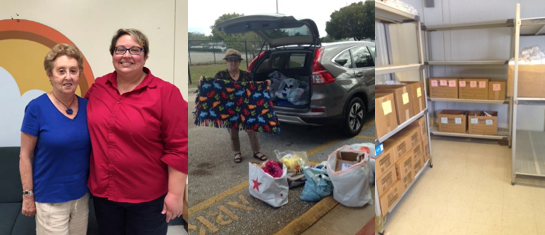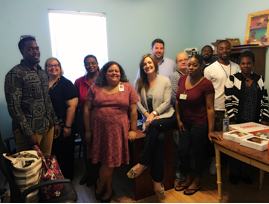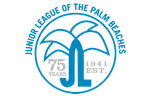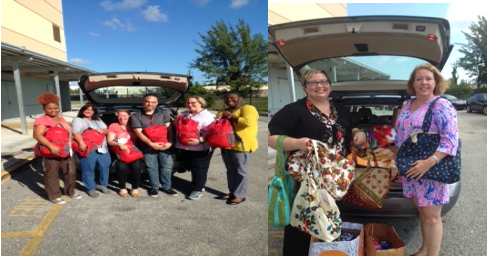The School District of Palm Beach County, Florida - Other School Department Based Activities
Celebrating 10 Years Of Wellness

Foster Care
Our primary goal is to provide the level of support necessary to promote successful outcomes in school for 1,600 of our students in foster care. We focus has been to ensure our foster students are:
- entitled to remain in their same school when it is in their best interest
- transitioned between schools in a seamless manner
- supported and advocated for as they participate in all aspects of schooling
- provided the necessary supports to prevent dropout, truancy, and disciplinary issues
- encouraged and supported as they seek to enter into and complete post-secondary coursework
Foster Care Liaison
The Foster Care Liaison in Palm Beach County is Laura Shoemaker. Laura is a resource to school staff, child welfare case managers, and foster parents when any student challenges arise with our children in care. Additionally, Laura is available to:
- Provide academic support and remove barriers for children in care
- Provide current information to schools regarding caregivers and dependency case managers
- Provide registration requests for the Free Meals Program
- Process Dependency Shelter Court Orders by updating students’ schools on parental status
- Process transportation requests
- Provide Dependency Case Managers with educational records (appropriate educational release required)
- Assist Dependency Case Managers when enrolling and withdrawing students as needed
- Collaborate with SEDNET, School District DJJ, and Education Alternatives for appropriate school placements
- Promote student enrollment in Choice and Career Technical Education options
Foster Care Campus Coordinators (FC3)
This year a multi-departmental and community partnership provided a 2-hour orientation for Foster Care Campus Coordinators (FC3). The goal was for FC3 to support the academic and social/emotional learning of students in foster care. FC3 served as a resource to school personnel, welcomed students, tracked any academic progress, verified referrals to School Based Team and/or tracked ESE progress. They engages student in any extracurricular activities of interest.
The October training provided 91 school representatives and 2 district department representatives with the School District’s first annual manual. Each person received an overview of students in care, how a student arrives in care, roles and responsibilities, district resources, registration information, clarification of parental rights, and transitions of students in care.
Educational Surrogates
The Department of Exceptional Student Education’s SEDNET Manager trains Guardian ad Litem volunteers to serve children in care as an Educational Surrogates. Educational Surrogates are persons who acts in the interests of an exceptional student, in the ESE process. Since these individuals serve children in care, SEDNET has collaborated with the Foster Care Liaison to participate in the training and become a district resource. This connection between Guardian ad Litem and the Foster Care Liaison will better identify student needs for more prompt resolution.
FL REACH Symposium – College Bound Foster Youth
According to the Florida College Access Network, the State of Florida provides “Free tuition and $1,256 a month in living stipends. That’s the promise Florida makes to its current and former foster youth attending the state’s public colleges and universities. Yet only 1 in 6 youth ‘aging out’ of foster care take advantage of this benefit. At ages 18 to 20, instead of attending college or career school, many foster youth find themselves struggling to meet the most basic of needs. According to a 2012 survey by the Florida Department of Children and Families,
- 85 percent in this age group are unemployed
- 38 percent lack either a high school diploma or GED
- 24 percent have experienced homelessness as an adult”
Florida College Access Network, May 19, 2014
The mission of Florida Reach Symposium is to equip educational institutions to improve post-secondary outcomes and career transitions for foster care youth and alumni through support, resources, networking and determining collective impact. The college-based support programs and peer-led organizational information will be provided to all SY’17 Foster Care Campus Coordinators.
Everybody’s a Teacher Initiative
This quarterly, Palm Beach County collaboration is between the School District’s ESE/SEDNET, Safe Schools Departments and Education Alternative’s Court Liaisons; Palm Beach County Court House; ChildNet; Vita Nova; Best Foot Forward; Department of Children and Families; Children’s Home Society; Guardian ad Litem; and Legal Aid Society. This team works together to resolve immediate needs of students in care and create solutions to better serve students through each agency. Additionally, the Guardian ad Litem office identified those in foster care having a GAL, serving as Educational Surrogates to better meet student needs with disabilities. This critical information is provided on students’ contact screens for the convenience of ESE Contacts to schedule IEP meetings.
National Council of Jewish Women 
The National Council of Jewish Women (NCJW), Palm Beach Section, has partnered with the Department of Safe School's McKinney-Vento Program, to open a Kids Community Closet (KCC). This closet serves unmet needs of up to 3000 homeless children and up 1600 youth in foster care. This Kids Community Closet, housed in Safe Schools at Lincoln Elementary School, provides underwear, socks, blankets and personal care items that are not traditionally provided by federal funds, and are urgently needed, by those the McKinney-Vento Program serves. NCJW's mission is to improve the quality of life for women, children and families. Members recognize how critical it is for students to be able to access basic hygiene needs and to dress appropriately, so they can attend school and focus on learning.

Residential Group Home Staff Educational Training
The SEDNET Manager and Foster Care Liaison has provided educational trainings to residential group home staff for Vision Quest. We have reviewed ESE eligibility, prompt school enrollment, foster care support services and tools for students’ academic success.

Junior League of the Palm Beaches’ 
Pink Palm Brigade
The Foster Care Liaison has established a collaborative relationship with the Pink Palm Brigade. Over the past year, Junior Leaguers have donated care packages, backpacks, college-bound gift baskets and luggage with life essentials for our Unaccompanied Homeless Youth and youth in foster care.

Every Student Succeeds Act
On December 10, 2015, President Obama signed the Every Student Succeeds Act (ESSA), amending the Elementary and Secondary Education Act. For the first time, ESSA embeds in federal education law provisions that promote school stability and success for youth in care and collaboration between education and child welfare agencies to achieve these goals. Children in foster care are some of the country’s most educationally disadvantaged students. The American Bar Association Center on Children and the Law, Education Law Center, and Juvenile Law Center provides research on these issues. Studies show that students in foster care experience: school suspensions and expulsions at higher rates than their peers not in foster care, lower standardized test scores in reading and math, high levels of grade retention and drop-out, and far lower high school and college graduation rates.
ESSA is expected to reduce disruptions in education for youth in foster care, and provide them with greater school stability, continuity, and success through a number of provisions, including:
- Allowing youth in foster care to remain in the same school even when their foster home placements are changed
- Requiring schools to immediately enroll children in foster care after a school move Requiring points of contact in every state education agency as well as many school districts
- Requiring plans for school transportation for youth in care
- Tracking achievement data for youth in care
National Center for Youth Law, December 10, 2015
Neglected Residential Group Home Tutorial Program
Youth placed in group homes, mental health facilities, or other residential settings often face daunting educational challenges. The Department of Federal and State Programs and the Department of Safe Schools collaborate to provide academic support to school-aged children residing in select neglected residential group homes. Students who participate in the tutorial program receive supplemental academic services and mentoring from School District certified teachers.
Our primary goal is to provide the level of support necessary to promote successful outcomes in school for 1,600 of our students in foster care. We focus has been to ensure our foster students are:
- entitled to remain in their same school when it is in their best interest
- transitioned between schools in a seamless manner
- supported and advocated for as they participate in all aspects of schooling
- provided the necessary supports to prevent dropout, truancy, and disciplinary issues
- encouraged and supported as they seek to enter into and complete post-secondary coursework